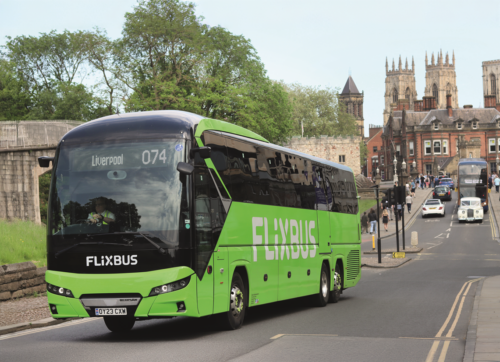
Jonathan Welch takes a trip from York to Manchester aboard the new FlixBus cross country route, and catches up on some of the brand’s latest developments
FlixBus. It’s a name we’ve heard a lot of over the last few years. For some, it’s just a green coach that takes them where they want to go. For others, it’s a new name to challenge and upset the status quo. Maybe you’re one of the traditionalists who thinks coaches should say National Express on the side. Or maybe you’re among those who have forgotten that it isn’t too long since we were watching to see how a newcomer that no-one had heard of called ‘megabus’ would affect the established order of things.
Some might even go as far as saying that it’s a name which has appeared too often in these pages, but let’s take a step back: FlixBus is a company which is doggedly and decisively pursuing its goal to have the biggest intercity coach network in the UK as well as aggressively expanding worldwide. The potentially huge Indian market is the latest to feel its arrival, a potentially brave move in a country not renowned for high standards of driving or road safety.
On more familiar territory, the company recently launched a new trans-Pennine service, linking York to Leeds, Manchester and Liverpool via the M62. Rather than just read the press release or arrange a short interview via Zoom or Microsoft Teams, I decided on a different strategy, and headed to York to join FlixBus’ UK PR Manager Sarah Bartlett and Head of Business Development Luca Castronuovo aboard a Liverpool-bound service. Also joining us was Phil Hitchen, Managing Director of partner operator Belle Vue, which runs the service on behalf of FlixBus using a fleet of brand new Yutong GT12 coaches.
On board
After a catch-up and a chin-wag over a light lunch, (the expenses claim will likely call it ‘networking’ I’m sure), we were at the Leeman Road stop ready for a 1330hrs departure. The stop is centrally located right outside the city walls, and in close proximity to the railway station, making it easy to find even for passengers unfamiliar with the city. I didn’t notice any specific FlixBus signage, and being an on-street stop meant no shelter or other facilities, but there are plenty nearby, and this is a low-cost coach service not a first class airline, after all.
[…]By subscribing you will benefit from:
- Operator & Supplier Profiles
- Face-to-Face Interviews
- Lastest News
- Test Drives and Reviews
- Legal Updates
- Route Focus
- Industry Insider Opinions
- Passenger Perspective
- Vehicle Launches
- and much more!


